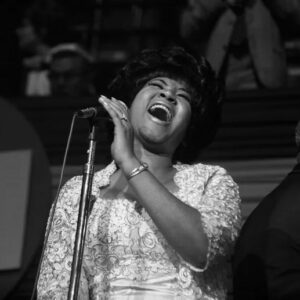Aretha Franklin, the “Queen of Soul,” needs little introduction. Her name is synonymous with music of unparalleled emotional depth, power, and grace. With a career spanning more than six decades, Franklin’s voice transcended genres, generations, and societal boundaries. But beyond her vocal prowess, it’s the stories behind her songs that reveal the true magnitude of her influence. In this article, we dive into the inspirations and untold histories of Aretha’s greatest hits, examining how she took classic songs and reshaped them into anthems of empowerment, love, and social change.
1. “Respect” (1967): A Revolutionary Anthem of Empowerment
Aretha Franklin’s version of “Respect” is one of the most iconic songs in the history of popular music. Originally written by Otis Redding and released in 1965, Redding’s version of “Respect” was about a man demanding respect from his woman upon returning home from work. However, when Aretha took the song into her hands, it became something far larger than a love song—it became a call for dignity, equality, and self-worth, particularly for African Americans and women.
Franklin, already an established artist by the time she recorded “Respect”, infused the song with her own experience, transforming it into a rallying cry for both the feminist and civil rights movements. With the opening lines—“What you want, baby, I got it; What you need, you know I got it”—Franklin made it clear that the respect she was demanding wasn’t just romantic; it was a demand for personal recognition, societal change, and justice.
The song’s release in 1967 came at a time of immense social upheaval in the United States, during the height of the Civil Rights Movement and the rise of second-wave feminism. Franklin’s powerful delivery, backed by a rousing rhythm section, transformed the song from a simple plea for attention into an anthem of empowerment. In an era when women, especially Black women, were often denied their voice, Franklin’s rendition was both a bold statement of self-worth and a collective call to arms for social justice.
The legacy of “Respect” has only grown over the decades. It became the soundtrack to movements calling for equality, from marches for civil rights to modern-day feminist rallies. Franklin’s version of “Respect” wasn’t just a hit—it became a permanent fixture in the cultural lexicon, immortalizing Aretha as a figure of resistance and empowerment.
2. “(You Make Me Feel Like) A Natural Woman” (1967): A Ballad of Strength and Vulnerability
While Aretha Franklin’s “Respect” became an anthem for social change, “(You Make Me Feel Like) A Natural Woman” stands as a stunning example of her ability to express vulnerability and emotion through song. Written by the legendary Carole King, with lyrics by Gerry Goffin, “Natural Woman” is a love ballad that captures the tenderness and beauty of romantic devotion.
However, Franklin’s version transcends the simple declarations of affection found in the original. Her rendition, recorded at Atlantic Studios in 1967, is a testament to her mastery of phrasing, her understanding of the emotional power of music, and her ability to turn a song into a deeply personal experience. Franklin’s delivery is rich and layered, conveying both the strength and the softness of a woman in love.
The song’s lyrics speak to the transformative power of love: “You make me feel like a natural woman.” For Franklin, “Natural Woman” became a signature piece, a performance that blended gospel roots with soul and R&B, capturing universal themes of love, self-worth, and emotional connection. There’s a palpable sense of intimacy in Franklin’s performance—an invitation for listeners to connect with their own experiences of love and longing.
Its legacy lies not only in its place as one of Aretha’s most beloved songs but also in its enduring cultural significance. As one of Franklin’s most covered tracks, it has found new life in various interpretations, from pop culture moments like its inclusion in the 2000 film The Break-Up to being reinterpreted by a new generation of artists. Yet, it is Aretha’s original version that remains definitive, her voice forever associated with both the strength and vulnerability inherent in love.
3. “I Say a Little Prayer” (1968): A Soulful Expression of Longing and Devotion
In 1968, Aretha Franklin took Burt Bacharach and Hal David’s classic song “I Say a Little Prayer”—a light, somewhat bouncy pop tune—and transformed it into a deeply soulful ballad. The original version, performed by Dionne Warwick in 1967, was a catchy, upbeat tune about a woman longing for her partner. Aretha’s version, however, transcended the surface-level sentiment of the original and imbued it with layers of depth and yearning.
Franklin’s take on “I Say a Little Prayer” turned it into a gospel-infused reflection on devotion. Her voice, both tender and powerful, elevated the lyrics into something far more profound. She didn’t just sing the words; she lived them. Aretha’s interpretation added a sense of urgency and longing that was palpable in every note. Each repetition of the line “I say a little prayer for you” felt like a heartfelt plea, turning the song into an emotional prayer for love, connection, and strength.
The story behind the recording is as compelling as the song itself. Aretha was known for her ability to make any song her own, but with “I Say a Little Prayer”, she took a simple pop melody and layered it with soulful, gospel-infused harmonies that transformed the track into an anthem of longing and devotion. The result was a song that not only became a hit but also solidified Aretha’s reputation as a master interpreter of songs. Her version has become the definitive one, making it one of her most beloved hits and a staple in her live performances.
4. “Chain of Fools” (1967): Heartbreak and Resilience
Love, heartbreak, and resilience are central themes in “Chain of Fools”, a song that became one of Aretha Franklin’s most celebrated hits. Written by Don Covay, the song speaks to the pain of betrayal and the emotional struggles that come with being in a toxic, yet unbreakable relationship.
In “Chain of Fools”, Aretha’s powerful vocals convey the complexity of heartbreak—pain, anger, and the determination to move forward despite the emotional weight. The song’s title itself speaks to the cyclical nature of toxic love, where one feels bound in a “chain” of repeated mistakes and suffering. Franklin’s vocal delivery—a combination of raw emotion and unmatched control—was both a reflection of the personal anguish within the lyrics and a demonstration of her ability to turn that pain into a universal anthem.
The song’s legacy is tied to its raw honesty and the way Franklin was able to take a tale of personal suffering and turn it into a triumph of resilience. For anyone who has experienced the pain of love gone wrong, “Chain of Fools” remains a testament to the power of music as a cathartic force. Aretha’s interpretation of this classic became a part of the soundtrack of the 1960s and remains one of her signature tracks.
5. “Think” (1968): A Feminist Anthem for the Ages
Perhaps no song in Aretha Franklin’s repertoire is as unabashedly empowering as “Think”, a track that was written by Aretha herself. With its funky, infectious beat and bold, confident lyrics, “Think” was a direct challenge to women’s roles in society, encouraging them to assert their independence and value.
Released in 1968, “Think” became one of Franklin’s most powerful feminist anthems. It was a declaration of female strength, a call for women to stop being complacent and to demand the respect and equality they deserved. The lyrics—“You better think (think), think about what you’re trying to do to me”—are as much an interrogation as a declaration, challenging the status quo and encouraging women to take control of their lives.
The story behind “Think” is a reflection of Aretha’s own journey toward self-empowerment. She had already achieved international fame, but she was also deeply attuned to the struggles of women and African Americans in a turbulent social climate. By writing “Think”, Aretha not only captured the spirit of the time but also became a vocal advocate for women’s rights. Her defiant, no-nonsense delivery made the song an enduring anthem of personal strength and self-determination.
Conclusion: The Enduring Legacy of Aretha Franklin’s Music
Aretha Franklin’s music was more than just entertainment; it was a voice for change, a platform for personal expression, and a celebration of the human spirit. Her songs, from “Respect” to “Think”, became touchstones for generations of listeners who found in her music both a reflection of their own experiences and a call to action. Aretha’s unparalleled vocal ability, combined with her deep understanding of the emotional core of each song, allowed her to elevate popular music into a powerful tool for social change.
Each of Franklin’s iconic songs tells a story—whether it’s about love, respect, or social justice—and those stories are as relevant today as they were when they were first recorded. Aretha’s legacy continues to inspire new generations of artists and activists, proving that her music will never be forgotten. Through her songs, Franklin not only shaped the sound of soul and R&B but also paved the way for a new kind of cultural and social consciousness. In the end, Aretha Franklin’s music was not just a reflection of the world; it was a powerful force that helped to change it.





